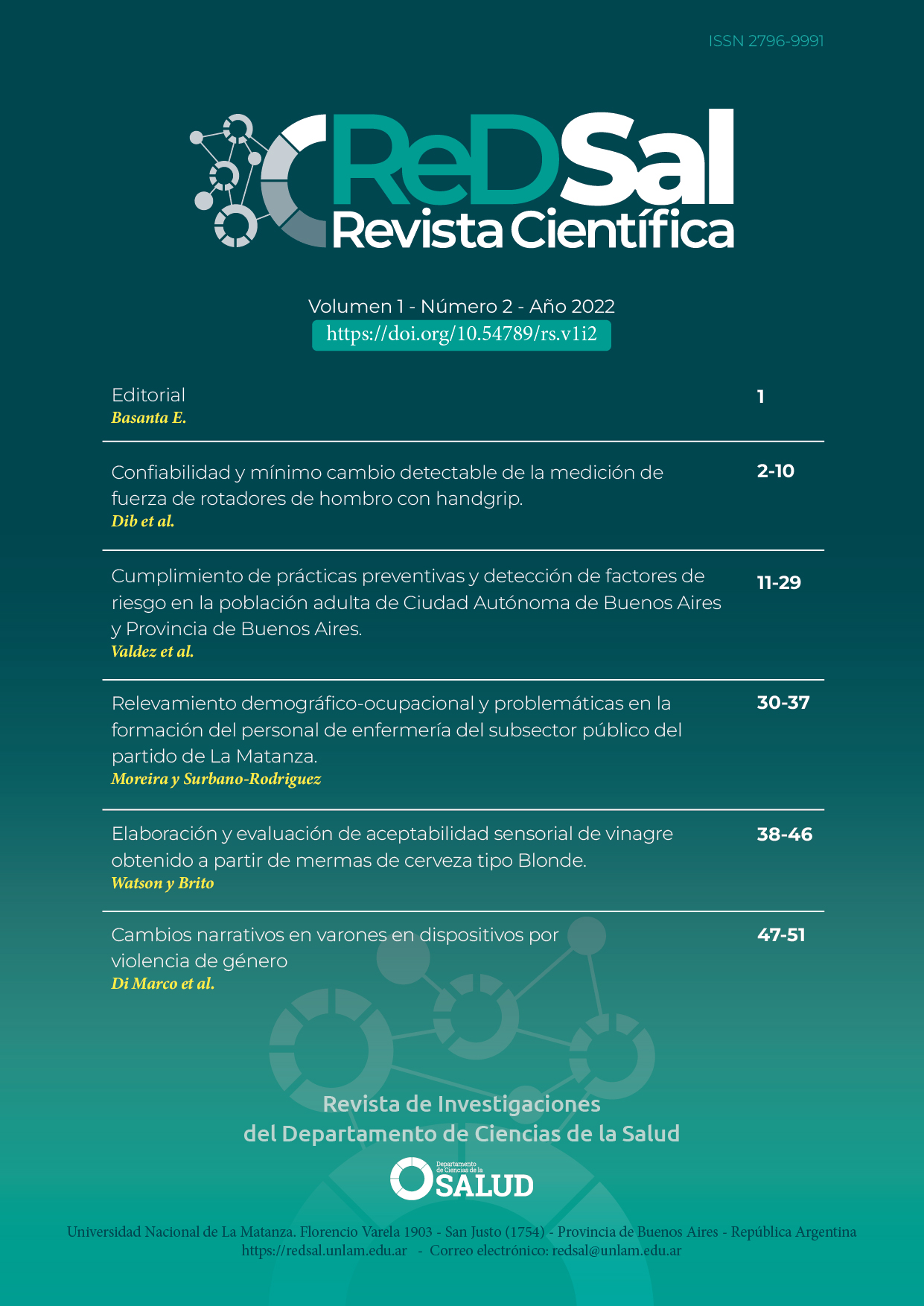Confiabilidad y mínimo cambio detectable de la medición de fuerza de rotadores de hombro con handgrip
DOI:
https://doi.org/10.54789/rs.v1i2.12Palabras clave:
reproducibilidad de los resultados, dinamómetro de fuerza muscular, hombro, manguito de los rotadores, fuerza muscular, confiabilidadResumen
Objetivos: Determinar la confiabilidad interobservador de la evaluación de la fuerza muscular de rotadores de hombro mediante el dinamómetro handgrip (HG).
Materiales y métodos: Se incluyeron 21 participantes voluntarios sanos. Se analizó la confiabilidad entre la primera y segunda medición realizada por 2 diferentes operadores para la rotación externa e interna, tanto del miembro dominante como del no dominante. Se utilizó el Coeficiente
de Correlación Intraclase (CCI) con sus respectivos intervalos de confianza al 95%. Para determinar el umbral de cambio real en la fuerza de HG cuando diferentes valuadores
registran las mediciones, se calculó el mínimo cambio detectable (MCD)
Resultados: Se observó una excelente confiabilidad entre evaluador para la rotación externa dominante y no dominante (CCI= 0.80 [IC95% 0.58 - 0.92] y CCI 0.80 [IC95%= 0.56 - 0.91], respectivamente). La confiabilidad interevaluador para la rotación interna dominante resultó regular
(CCI: 0.56 [IC95% 0.18 - 0.80] y para la no dominante buena (CCI:0.61 [IC95% 0.25 - 0.82]).
Conclusión: El estudio mostró que la confiabilidad interobservador de la herramienta HG para medir fuerza de hombro es excelente para los rotadores externos y de regular a buena para los rotadores internos.
Citas
Linaker CH, Walker-Bone K. Shoulder disorders and occupation. Best Pract Res Clin Rheumatol 2015 Jun;29(3):405-23. DOI: 10.1016/j.berh.2015.04.001
Greving K, Dorrestijn O, Winters JC, Groenhof F, van der Meer K, Stevens M, et al. Incidence, prevalence, and consultation rates of shoulder complaints in general practice. Scand J Rheumatol. 2012 Mar;41(2):150-5. DOI: 10.3109/03009742.2011.605390
Luime JJ, Koes BW, Hendriksen IJ, Burdorf A, Verhagen AP, Miedema HS, et al. Prevalence and incidence of shoulder pain in the general population; a systematic review. Scand J Rheumatol 2004;33(2):73-81.
Muhafara, G. J., Villarruel, M., Cura, A., Tozzi, W., Vicente, A., Esperón, L. F., Salzberg, S., Soliño, S., Navarro, E., Argento, F., & Policastro, P. (2021). Estudio epidemiológico de afecciones musculoesqueléticas de hombro en la Ciudad de Buenos Aires. Argentinian Journal of Respiratory & Physical Therapy, 3(2), 13-21
Cools AM, Michener LA. Shoulder pain: can one label satisfy everyone and everything? Br J Sports Med. 20: 16 Mar;51(5):416-417. DOI: 10.1136/bjsports-2016-096772
Cools AM, Vanderstukken F, Vereecken F, Duprez M, Heyman K, Goethals N, et al. Eccentric and isometric shoulder rotator cuff strength testing using a hand-held dynamometer: reference values for overhead athletes. Knee Surg Sports Traumatol Arthrosc. 2016 Dec;24(12):3838-3847. DOI: 10.1007/s00167-015-3755-9
Warner JJ, Micheli LJ, Arslanian LE, Kennedy J, Kennedy R. Patterns of flexibility, laxity, and strength in normal shoulders and shoulders with instability and impingement. Am J Sports Med. 1990 Jul-Aug; 18(4):366-75. DOI: 10.1177/036354659001800406
Stark T, Walker B, Phillips JK, Fejer R, Beck R. Hand-held dynamometry correlation with the gold standard isokinetic dynamometry: a systematic review. PM R 2011; 3:472-9. DOI: 10.1016/j.pmrj.2010.10.025
Cools AM, De Wilde L, Van Tongel A, Ceyssens C, Ryckewaert R, Cambier DC. Measuring shoulder external and internal rotation strength and range of motion: comprehensive intra-rater and inter-rater reliability study of several testing protocols. J Shoulder Elbow Surg. 2014 Oct;23(10):1454-61. DOI: 10.1016/j.jse.2014.01.006
Hayes K, Walton JR, Szomor ZL, Murrell GA. Reliability of 3 methods for assessing shoulder strength. J Shoulder Elbow Surg. 2002 Jan-Feb;11(1):33-9. DOI: 10.1067/mse.2002.119852
Nagatomi T, Mae T, Nagafuchi T, Yamada SI, Nagai K, Yoneda M. Shoulder manual muscle resistance test cannot fully detect muscle weakness. Knee Surg Sports Traumatol Arthrosc 2017 Jul;25(7):2081-2088. DOI: 10.1007/s00167-016-4380-y
Innes E. Handgrip Strength testing: a review of the literature. Australian Occupational Therapy Journal.1999; 46 (3): 120-140.
Kottner J, Audige L, Brorson S, Donner A, Gajewski BJ, Hróbjartsson A, et al. Guidelines for Reporting Reliability and Agreement Studies (GRRAS) were proposed. Int J Nurs Stud. 2011 Jun;48(6):661-71
Shoukri MM, Asyali MH, Donner A. Sample size requirements for the design of reliability study: review and new results. Stat Methods Med Res 2004; 13(4):251-271
Terwee CB, Bot SD, De Boer MR, Van Der Windt DA, Knol DL, Dekker J, et al. Quality criteria were proposed for measurement properties of health status questionnaires. J Clin Epidemiol. 2007; 60(1):34–42
Fleiss JL, Reliability of measurement In: The Design and Analysis of Clinical Experiments. 2011. New York: Wiley; 1-32. DOI:10.1002/9781118032923
Hobart JC, Cano SJ, Warner TT, Thompson AJ. What sample sizes for reliability and validity studies in neurology? J Neurol. 2012 Dec;259(12):2681-94.
Johansson FR, Skillgate E, Lapauw ML, Clijmans D, Deneulin VP, Palmans T, et al. Measuring Eccentric Strength of the Shoulder External Rotators Using a Handheld Dynamometer: Reliability and Validity. J Athl Train. 2015 Jul;50(7):719-25
Riemann BL, Davies GJ, Ludwig L, Gardenhour H. Hand-held dynamometer testing of the internal and external rotator musculature based on selected positions to establish normative data and unilateral ratios. J Shoulder Elbow Surg 2010 Dec; 19(8):1175-83. DOI: 10.1016/j.jse.2010.05.021
Horsley I, Herrington L, Hoyle R, Prescott E, Bellamy N. Do changes in hand grip strength correlate with shoulder rotator cuff function? Shoulder Elbow. 2016 Apr;8(2):124-9. DOI: 10.1177/1758573215626103
Portney LG, Watkins MP. Foundations of clinical research applications to practice. 3rd ed. Upper Saddle River (New Jersey): Pearson Education Inc.; 2009.
Weir JP. Quantifying test-retest reliability using the intraclass correlation coefficient and the SEM. J Strength Cond Res 2005; 19:231–40.
Damron LA, Dearth DJ, Hoffman RL, Clark BC. Quantification of the corticospinal silent period evoked via transcranial magnetic stimulation. J Neurosci Methods. 2008 Aug 15;173(1):121-8
Atkinson G, Nevill AM. Statistical methods for assessing measurement error (reliability) in variables relevant to sports medicine. Sports Med. 1998 Oct;26(4):217-38
Bland JM, Altman DG. A note on the use of the intraclass correlation coefficient in the evaluation of agreement between two methods of measurement. Comput Biol Med. 1990;20(5):337-40.
Hallgren KA. Computing inter-rater reliability for observational data: an overview and tutorial. Tutor Quant Methods Psychol. 2012;8(1):23–34.
Shrout PE, Fleiss JL. Intraclass correlations: Uses in assessing rater reliability. Psychological Bulletin. 1979; 86(2):420–428. DOI: 10.1037/0033-2909.86.2.420
Cicchetti DV. Guidelines, criteria, and rules of thumb for evaluating normed and standardized assessment instruments in psychology. Psychological Assessment. 1994; 6(4):284–290. DOI: 10.1037/1040-3590.6.4.284
Bland JM, Altman DG. Statistical methods for assessing agreement between two methods of clinical measurement. Lancet 1986;1(8476):307–10.
De Vet HC, Terwee CB, Knol DL, Bouter LM. When to use agreement versus reliability measures. J Clin Epidemiol. 2006 Oct;59(10):1033-9
Mokkink LB, Terwee CB, Patrick DL, Alonso J, Stratford PW, Knol DL, et al. The COSMIN study reached international consensus on taxonomy, terminology, and definitions of measurement properties for health-related patient-reported outcomes. J Clin Epidemiol. 2010 Jul;63(7):737-45
Remigio W, Tsai N, Layos L, Chavez M. Inter-rater and intra-rater reliability of the fluid goniometer for measuring active knee flexion in painful knees; correlations do not mean agreement. J Phys Ther Sci. 2017 Jun;29(6):984-988
Chen B, Liu L, Bin Chen L, Cao X, Han P, Wang C, Qi Q. Concurrent Validity and Reliability of a Handheld Dynamometer in Measuring Isometric Shoulder Rotational Strength. J Sport Rehabil. 2021 Jan 19;30(6):965-968. DOI: 10.1123/jsr.2020-0021.
Fieseler G, Molitor T, Irlenbusch L, Delank KS, Laudner KG, Hermassi S, Schwesig R. Intrarater reliability of goniometry and hand-held dynamometry for shoulder and elbow examinations in female team handball athletes and asymptomatic volunteers. Arch Orthop Trauma Surg. 2015 Dec;135(12):1719-26. DOI: 10.1007/s00402-015-2331-6.
Cadogan A, Laslett M, Hing W, McNair P, Williams M. Reliability of a new hand-held dynamometer in measuring shoulder range of motion and strength. Man Ther. 2011 Feb;16(1):97-101. DOI: 10.1016/j.math.2010.05.005

Descargas
Publicado
Cómo citar
Número
Sección
Licencia
Derechos de autor 2022 ReDSal

Esta obra está bajo una licencia internacional Creative Commons Atribución 4.0.









